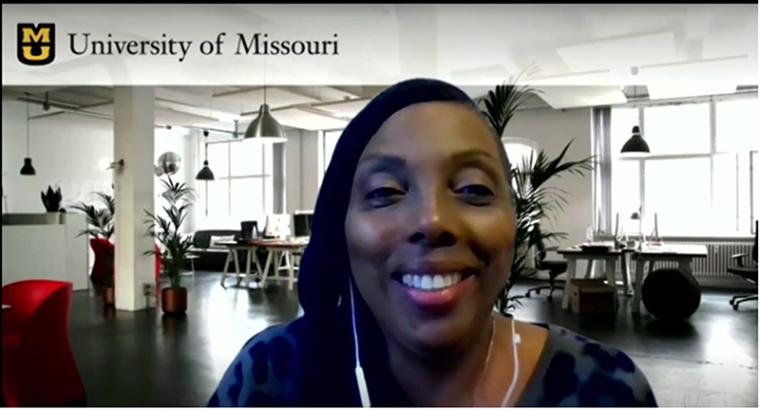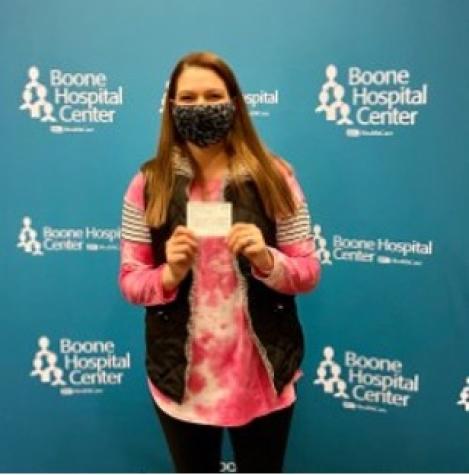COLUMBIA, Mo. – With Missouri seeing hundreds of new COVID-19 cases each day, University of Missouri Extension and partners are working to decrease these numbers as much as possible.
The MU Rural Vaccination Action Committee is composed of 15 individuals from MU Extension, MU School of Medicine, MU School of Health Professions and MU Health Care. The committee is sharing influenza and COVID-19 information from the U.S. Centers for Disease Control and Prevention (CDC) and the Missouri Department of Health and Senior Services (DHSS) to help keep MU Extension employees and the public up to date.
“There are some misconceptions that have been shared on social media, and we are focused on giving accurate COVID-19 information from the CDC and the science behind it,” said Chiquita Chanay, a community health outreach specialist with MU Extension. “We want to extend that information to communities so that we can increase the number of individuals who are vaccinated, not only to protect ourselves but others around us.”
Whether you’re from a rural area or large city, no one is immune to the virus. Chanay and fellow committee members stress that it is more important than ever to take the right precautions against COVID-19.
Chanay said it is also vital for people to get their flu shot as another COVID-19 measure. Lowering flu cases across the state alleviates stress on an already overwhelmed health care system.
“We first decided to work on educational materials for the flu vaccine and encourage Missourians to get their annual flu vaccine,” Chanay said. “As more information about the COVID-19 vaccines became available, we began focusing on how we can increase awareness for the COVID-19 vaccine and how we can help local communities get vaccinated.”
Committee member Kara Clovis, who recently earned a Master of Public Health from MU, says each community may have different needs.
“Coming from a small town, I know how hard it is to reach individuals who have been set in their ways forever,” Clovis said. “But continuing to provide education and sharing real-life stories will hopefully encourage them to take proper precautions. I think if we educated everyone on vaccinations and took away some of the myths and misconceptions surrounding vaccinations, the vaccination rate would be much higher.”
Chanay shares similar concerns when reviewing the data for Missouri.
“If you look at the statistics, most of the people who are hospitalized aren’t from Boone County but come to Columbia from the surrounding areas,” she said.
Having had COVID-19 themselves, Clovis and Chanay understand the pandemic’s impact on a personal as well as professional level.
“Because of my background, I always believed in the science and the epidemiology of the disease,” Chanay said. “But, now that I have gone through it myself, it makes me more passionate about making sure the correct information is being communicated with people. I not only want to protect myself, but I also want to protect my community and my family members.”
Chanay and Clovis both describe COVID-19 symptoms that they still deal with to this day.
“I am still experiencing a loss of my taste and smell,” Chanay said. “It comes and goes, and I have no control over it.”
Clovis said brain fog was one of the most troubling experiences associated with the virus. “One day I didn’t know how to open my email,” she said. “My brain was telling me one thing and I could not do it."
Clovis continues to have short-term memory loss and works with her health care team to monitor and treat her symptoms.
“The one thing I would tell people is don’t let your guard down,” Chanay said. “I let mine down for an hour around family members I don’t live with, and I got COVID. Even though we get excited to see our family members, we still need to be extra cautious. We can only be accountable for ourselves.”
Referencing guidance from the CDC, Missouri DHSS and medical professionals, the Rural Vaccination Action Group recommends wearing a mask, staying at least 6 feet from others, washing your hands and avoiding crowds as much as possible.
“I think that if we all took two or three consistent steps, we might be able to slow this virus down just a little bit,” Chanay said. “Making a sacrifice like putting others before ourselves can make a huge difference. I know we all want to socialize, but if we continue to stay at home, I think we can really get ahead of this thing.”
The committee provides health-focused information for children, adults, multilingual homes, and medical professionals and providers. For more information about COVID-19 and influenza, visit www.livehealthy.missouri.edu.
Photos available:
https://extension.missouri.edu/media/wysiwyg/Extensiondata/NewsAdmin/Photos/2021/20210211-chanay-1.jpg
MU Extension community health outreach specialist Chiquita Chanay shares the importance of vaccines in a recent livestream.
https://extension.missouri.edu/media/wysiwyg/Extensiondata/NewsAdmin/Photos/2021/20210211-clovis-1.jpg
Rural Vaccination Action Group member Kara Clovis proudly holds her COVID-19 vaccination card.
Writer: Adriene Aubuchon

